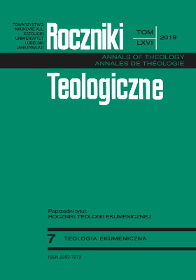Dialogical Catholicity of the Church
Abstract
The Church’s catholicity is confessed by almost all Churches in the Christian Creed. However, as a result of historical divisions within Christianity, this attribute of the Church has often adopted confessional and narrow interpretations. The ecumenical activities are aimed at restoring the Catholic fullness and, therefore, the understanding of catholicity or the Catholic fullness of the Church must be closely related to the understanding of ecumenism. The article attempts to justify the thesis that catholicity of the Church, by its nature, has a dialogical dimension. It results from the constant tension between the multiplicity of ecclesial identities and the unity of the one people of God as an objective of ecumenism. The ecumenical way, however, does not omit the specificity of the confessional identity, but it demands recognition of the legitimate multiplicity and diversity of forms of expressing one Christian faith. According to the assumptions of the ecumenical hermeneutics, various ecclesial traditions should be interpreted in the light of what unites and not what divides, and the elements belonging to the ecumenically-, that is dialogically-oriented catholicity, should be noticed and recognised.
References
Beinert, Wolfgang. Um das dritte Kirchenattribut: Katholizität in der Geschichte der Theologie. Katholizität in der evangelisch-lutherischen Theologie. Vol. I. Essen: Ludgerus Verlag Hubert Wingen KG, 1964.
Frieling, Reinhard. “Die ökumenische Bewegung vor einem Paradigmenwechsel?” In Ökumene zwischen „postmoderner Beliebigkeit“ und “Rekonfessionalisierung”, edited by Peter Neuner and Birgitta Kleinschwärzer-Meister, 103–130. Münster, Hamburg, Berlin, London: LIT Verlag, 2006.
Goodall, Norman. The Uppsala Report 1968. Official report of the Fourth Assembly of the World Council of Churches, Uppsala July 4-20, 1968. Geneva: World Council of Churches 1968.
Graf, Friedrich Wilhelm, and Dieter Korsch. “Jenseits der Einheit. Reichtum der Vielfalt. Der Widerstreit der ökumenischen Bewegungen und die Einheit der Kirche Jesu Christi.” In Jenseits der Einheit. Protestantische Ansichten der Ökumene, edited by Friedrich Graf Wilhelm and Dieter Korsch, 9–33 . Hannover: Lutherisches Verlagshaus, 2001.
Hanc Wojciech. “Rzymskokatolickie rozumienie dialogu doktrynalnego.” In Ekumenizm doktrynalny: schyłek czy nowy początek?, edited by Tadeusz Kałużny and Zdzisław Józef Kijas, 11–46. Kraków: Wydawnictwo Naukowe UPJPII, 2018.
Heller, Dagmar. “Catholicity under Pressure. The Ambiguous Relationship between Diversity and Unity: President’s Address.” ÖkumenischeRundschau — Beiheft Nr. 105 (2016): 19–34.
Kantyka, Przemysław. “Dialog ekumeniczny katolicko-protestancki — założenia, zakres, rezultaty.” In Ekumenizm w posoborowym półwieczu. Sukcesy i trudności katolickiego zaangażowania na rzecz jedności chrześcijan, edited by Marcin Składanowski and Tadeusz Syczewski, 29–50. Lublin: Wydawnictwo KUL, 2013.
MacCulloch, Diar Maid. Die Reformation 1490–1700. München: Deutsche Verlags-Anstalt, 2008.
Napiórkowski, Stanisław Celestyn. “Ekumenizm a personalizm.” In Kościoły czy Kościół. Wybrane zagadnienia z ekumenizmu, edited by Leonard Górka Stanisław Celestyn Napiórkowski, 151–185. Warszawa: Verbinum, 1995.
Neuner, Peter. “Dialog als Selbstverwirklichung der Kirche.” Ökumenische Rundschau 59 (2010), 2: 190–205.
Neuner, Peter. “Katholische Identität im religiösen Markt der Möglichkeiten.” In Ökumene zwischen „postmoderner Beliebigkeit”and„Rekonfessionalisierung”, edited by Peter Neuner and Birgitta Kleinschwärzer-Meister, 55-71. Münster, Hamburg, Berlin, London: LIT Verlag, 2006.
Nikolaou, Theodor. “Katholizität, Orthodoxes Verständnis.” In Hanfried Krüger Werner Löser and Walter Müller-Römheld. Ökumene-Lexikon. Kirchen – Religionen – Bewegungen, 627–629. Frankfurt am Main: Lembeck Knecht 1987.
Plathow, Michael. “Kirchliche Identitäten und ökumenische Katholizität.” Ökumenische Rundschau — Beiheft Nr. 105 (2016): 377–390.
Porada, Rajmund. “Urzeczywistnianie się Kościoła w dialogu ekumenicznym – perspektywa katolicka.” Studia Paradyskie 28 (2018): 69–82.
Rahner, Johanna. Einheit und Vielfalt als Folge der Reformation und ekklesiologisches Problem. In Wem gehört die Reformation? Nationale und konfessionelle Dispositionen der Reformationsdeutung, edited by Günter Frank, Volker Leppin, and Herman J. Selderhuis, 182–203. Freiburg, Basel, Wien: Herder, 2013.
Ruhstorfer, Karlheinz. Befreiung des „Katholischen“. An der Schwelle zu globaler Identität. Freiburg, Basel, Wien: Herder, 2019.
Sander, Hans-Joachim. “Der Ort der Ökumene für die Katholizität der Kirche. Von der unmöglichen Utopie zur prekären Heterotopie.” in: Herders Theologischer Kommentar zum Zweiten Vatikanischen Konzil. Vol. V: Theologische Zusammenschau und Perspektiven, edited by Peter Hünermann and Bernd Jochen Hilberath, 188–200. Freiburg, Basel, Wien: Herder, 2006.
Sattler, Dorothea. “Ökumenisch eine katholische Kirche werden? Das Verhältnis zwischen Vielfalt und Einheit aus (einer) römisch-katholischen Sicht.” Ökumenische Rundschau – Beiheft Nr. 105 (2016): 67-80.
Schultheis, Dominik. Die Katholizität der Kirche. Versuch einer Bestimmung der dritten nota ecclesiae in der deutschsprachigen Systematischen Theologie seit dem Zweiten Vatikanum. Würzburg: Echter Verlag, 2015.
Thönissen, Wolfgang. Gerechtigkeit oder Barmherzigkeit. Das ökumenische Ringen um die Rechtfertigung. Paderborn, Leipzig: Bonifatius Verlag, Evangelische Verlagsanstalt, 2016.
Vischer, Lukas. “The Meaning of Catholicity – Preface.” The Ecumenical Review 16 (1963): 24–25.
Copyright (c) 2019 Roczniki Teologiczne

This work is licensed under a Creative Commons Attribution-NonCommercial-NoDerivatives 4.0 International License.





